Fleurs du Mal Magazine


Or see the index
In the poem-essays that comprise A Duration, writing is a physical act where writing and lived experience support one another in bodies—animal, plant, mineral, and word bodies—that are injured and heal, that die and continue in new forms, playing new roles.
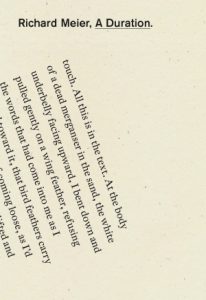 Here, in his fifth book, Richard Meier transmutes years of daily practices of attention—be it to a line spoken by Lear’s Fool, a train to Kingston, or “red inside green stem below eight white petals in a spiral with space between them attached to the yellow center”—into mesmerizing trajectories through an always unfolding present.
Here, in his fifth book, Richard Meier transmutes years of daily practices of attention—be it to a line spoken by Lear’s Fool, a train to Kingston, or “red inside green stem below eight white petals in a spiral with space between them attached to the yellow center”—into mesmerizing trajectories through an always unfolding present.
In the collapse of the border between writing and the body, A Duration, “play[s] both hearts with a heartbeat and kinship of place, time, mundanity in the continuous onrushing imagined joy.”
Richard Meier’s second book of poetry, Shelley Gave Jane a Guitar, was published by Wave Books in 2006. His first book, Terrain Vague, was selected by Tomaž Šalamun for the Verse Prize and published by Verse Press in 2001. His book In the Pure Block of the Whole Imaginary was published by Omnidawn in 2012. He is writer-in-residence at Carthage College and lives in Chicago, IL and Madison, WI.
Richard Meier
A Duration
Publication: 6 June 2023
Publisher: Wave Books
Language: Engish
Paperback: 120 pages
ISBN-10:1950268780
ISBN-13:978-1950268788
Regular price $18.00
• fleursdumal.nl magazine
More in: #Editors Choice Archiv, - Book Lovers, - Book News, - Bookstores, Archive M-N, Archive M-N

Sometimes In The Middle Autumn Days
Sometimes in the middle autumn days,
The windless days when the swallows have flown,
And the sere elms brood in the mist,
Each tree a being, rapt, alone,
I know, not as in barren thought,
But wordlessly, as the bones know,
What quenching of my brain, what numbness,
Wait in the dark grave where I go.
And I see the people thronging the street,
The death-marked people, they and I
Goalless, rootless, like leaves drifting,
Blind to the earth and to the sky;
Nothing believing, nothing loving,
Not in joy nor in pain, not heeding the stream
Of precious life that flows within us,
But fighting, toiling as in a dream.
O you who pass, halt and remember
What tyrant holds your life in bond;
Remember the fixed, reprieveless hour,
The crushing stroke, the dark beyond.
And let us now, as men condemned,
In peace and thrift of time stand still
To learn our world while yet we may,
And shape our souls, however ill;
And we will live, hand, eye and brain,
Piously, outwardly, ever-aware,
Till all our hours burn clear and brave
Like candle flames in windless air;
So shall we in the rout of life
Some thought, some faith, some meaning save,
And speak it once before we go
In silence to the silent grave.
George Orwell
(1903 – 1950)
Sometimes In The Middle Autumn Days
First published by The Adelphi, March 1933
• fleursdumal.nl magazine
More in: 4SEASONS#Autumn, Archive O-P, Archive O-P, George Orwell, Orwell, George
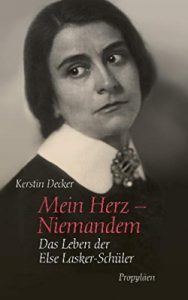
Die Verscheuchte
Es ist der Tag im Nebel völlig eingehüllt,
Entseelt begegnen alle Welten sich-
Kaum hingezeichnet wie auf einem Schattenbild.
Wie lange war kein Herz zu meinem mild…
Die Welt erkaltete, der Mensch verblich.
Komm bete mit mir – denn Gott tröstet mich.
Wo weilt der Odem, der aus meinem Leben wich?
Ich streife heimatlos zusammen mit dem Wild
Durch bleiche Zeiten träumend – ja ich liebte dich…
Wo soll ich hin, wenn kalt der Nordsturm brüllt?
Die scheuen Tiere aus der Landschaft wagen sich
Und ich vor deine Tür, ein Bündel Wegerich.
Bald haben Tränen alle Himmel weggespült,
An deren Kelchen Dichter ihren Durst gestillt-
Auch du und ich.
Else Lasker-Schüler
(1869 – 1945)
Die Verscheuchte
• fleursdumal.nl magazine
More in: #Editors Choice Archiv, Archive K-L, Archive K-L, Lasker-Schüler, Else
The Philosophy of Modern Song is Bob Dylan’s first book of new writing since 2004’s Chronicles: Volume One—and since winning the Nobel Prize for Literature in 2016.
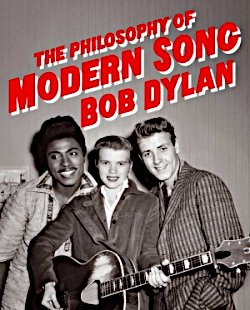 Dylan, who began working on the book in 2010, offers his extraordinary insight into the nature of popular music.
Dylan, who began working on the book in 2010, offers his extraordinary insight into the nature of popular music.
He writes over sixty essays focusing on songs by other artists, spanning from Stephen Foster to Elvis Costello, and in between ranging from Hank Williams to Nina Simone.
He analyzes what he calls the trap of easy rhymes, breaks down how the addition of a single syllable can diminish a song, and even explains how bluegrass relates to heavy metal.
These essays are written in Dylan’s unique prose. They are mysterious and mercurial, poignant and profound, and often laugh-out-loud funny. And while they are ostensibly about music, they are really meditations and reflections on the human condition.
Running throughout the book are nearly 150 carefully curated photos as well as a series of dream-like riffs that, taken together, resemble an epic poem and add to the work’s transcendence.
In 2020, with the release of his outstanding album Rough and Rowdy Ways, Dylan became the first artist to have an album hit the Billboard Top 40 in each decade since the 1960s.
The Philosophy of Modern Song contains much of what he has learned about his craft in all those years, and like everything that Dylan does, it is a momentous artistic achievement.
Bob Dylan has released thirty-nine studio albums, which collectively have sold over 125 million copies around the world. He won the Nobel Prize in Literature and has been awarded the French Legion of Honor, a Pulitzer Prize Special Citation, and the Presidential Medal of Freedom, the country’s highest civilian honor. His memoir, Chronicles: Volume One, spent a year on the New York Times bestseller list.
The Philosophy of Modern Song
by Bob Dylan
Publisher: Simon & Schuster
November 1, 2022
Language: English
Hardcover
352 pages
ISBN-10: 1451648707
ISBN-13: 978-1451648706
$22.50
• fleursdumal.nl magazine
More in: - Book News, - Bookstores, Archive C-D, Archive C-D, AUDIO, CINEMA, RADIO & TV, Bob Dylan, Dylan, Bob
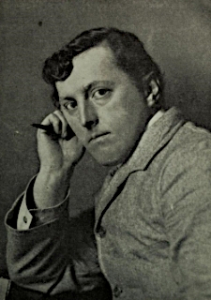
Poems
No Muse will I invoke; for she is fled!
Lo! where she sits, breathing, yet all but dead.
She loved the heavens of old, she thought them fair;
And dream’d of Gods in Tempe’s golden air.
For her the wind had voice, the sea its cry;
She deem’d heroic Greece could never die.
Breathless was she, to think what nymphs might play
In clear green depths, deep-shaded from the day;
She thought the dim and inarticulate god
Was beautiful, nor knew she man a sod;
But hoped what seem’d might not be all untrue,
And feared to look beyond the eternal blue.
But now the heavens are bared of dreams divine.
Still murmurs she, like Autumn, ´This was mine!’
How should she face the ghastly, jarring Truth,
That questions all, and tramples without ruth?
And still she clings to Ida of her dreams,
And sobs, ´Ah! let the world be what it seems!’
Then the shy nymph shall softly come again;
The world, once more, make music for her pain.
For, sitting in the dim and ghostly night,
She fain would stay the strong approach of light;
While later bards cleave to her, and believe
That in her sorrow she can still conceive!
Oh, let her dream; still lovely is her sigh;
Oh, rouse her not, or she shall surely die.
Stephen Phillips
(1864 – 1915)
Poems
• fleursdumal.nl magazine
More in: #Editors Choice Archiv, Archive O-P, Archive O-P
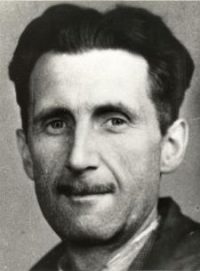
The Italian Soldier
Shook My Hand
The Italian soldier shook my hand
Beside the guard-room table;
The strong hand and the subtle hand
Whose palms are only able
To meet within the sounds of guns,
But oh! what peace I knew then
In gazing on his battered face
Purer than any woman’s!
For the flyblown words that make me spew
Still in his ears were holy,
And he was born knowing that I had learned
Out of books and slowly.
The treacherous guns had told their tale
And we both had bought it,
But my gold brick was made of gold –
Oh! who ever would have thought it?
Good luck go with you, Italian soldier!
But luck is not for the brave;
What would the world give back to you?
Always less than you gave.
Between the shadow and the ghost,
Between the white and the red,
Between the bullet and the lie,
Where would hide your head?
For where is Manuel Gonzalez,
And where is Pedro Aguilar,
And where is Ramon Fenellosa?
The earthworms know where they are.
Your name and your deeds were forgotten
Before your bones were dry,
And the lie that slew you is buried
Under a deeper lie;
But the thing that I saw in your face
No power can disinherit:
No bomb that ever burst
Shatters the crystal spirit.
George Orwell
(1903 – 1950)
The Italian Soldier Shook My Hand
• fleursdumal.nl magazine
Taken from ‘Looking Back on the Spanish War’, published by New Road, 1943. Poem written 1939
More in: Archive O-P, Archive O-P, George Orwell, Orwell, George
In a landscape scarred by conflict, two women begin a quest for a lost child and a lost world of peace.
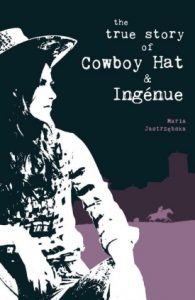 Bound together by love and acceptance, their story and path interweave with fellow outcasts — people like the ever-suave Dame Blanche, Sister Asunta, martial artist and magician, Master Wu Wu, and the lost soul, Tulip — but whether peace is simply the end of war or something deeper is something they must discover for themselves.
Bound together by love and acceptance, their story and path interweave with fellow outcasts — people like the ever-suave Dame Blanche, Sister Asunta, martial artist and magician, Master Wu Wu, and the lost soul, Tulip — but whether peace is simply the end of war or something deeper is something they must discover for themselves.
A haunting tale, told in a series of visionary prose poems, The True Story of Cowboy Hat & Ingénue interweaves memory and yearning to ask questions that reflect on our past and, disturbingly, on our futures.
Maria Jastrzębska is a Polish-born poet, editor and translator. Her most recent collection was At The Library of Memories (Waterloo Press 2013) and her selected poems, The Cedars of Walpole Park, have been translated into Polish by Anna Błasiak, Paweł Gawroński and Wioletta Grzegorzewska and published bilingually (Stowarzyszenie ŻŻwych Poetów 2015). Old Knives is a selection of her work translated into Romanian by Lidia Vianu and published bilingually by Integral Contemporary Literature Press (2017). She was co-editor with Anthony Luvera of Queer in Brighton (New Writing South 2014). She co-translated Iztok Osojnik’s selected poems Elsewhere with Ana Jelnikar and her translations of Justyna Bargielska’s selected poems The Great Plan B are published by Smokestack Press (2017). Her work features in the British Library poetry and translation project Poetry Between Two Worlds. Dementia Diaries, her literary drama, toured nationally with Lewes Live Lit in 2011. Her poems have been much anthologized from The Virago Book of Wicked Verse (1992) to This Line Is Not For Turning — An Anthology of Contemporary British Prose Poetry (Cinnamon Press 2011) and Hallelujah for 50ft Women (Bloodaxe 2015). Maria lives in Brighton and you can discover more about her work on her website. (https://mariajastrzebska.wordpress.com/)
The True Story of Cowboy Hat & Ingénue
Maria Jastrzębska
Prose-poetry
Language: English
Publisher: Cinnamon Press
2018
Paperback
70 pages
ISBN-10: 1911540033
ISBN-13: 978-1911540038
Price: 14,27 euro
• fleursdumal.nl magazine
More in: #Editors Choice Archiv, - Book News, - Bookstores, Archive I-J, Archive I-J, Cowboy Poetry
Michael Rosen was dangerously ill from COVID at the beginning of 2020 and as doctors told him, if he hadn’t received treatment, he would have ‘gone’.
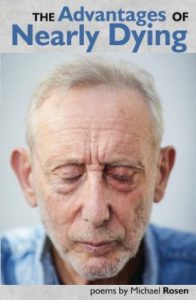 While he was in hospital, 42% of the patients on his intensive care ward died. He spent three months in hospital, of which nearly seven weeks were in an induced coma, followed by several weeks recovering in an ordinary ward and then in a Rehabilitation Hospital.
While he was in hospital, 42% of the patients on his intensive care ward died. He spent three months in hospital, of which nearly seven weeks were in an induced coma, followed by several weeks recovering in an ordinary ward and then in a Rehabilitation Hospital.
He couldn’t walk and his memory was damaged. Three years later his hearing and eyesight are still badly affected (‘I can’t hear with my left eye, I can’t see with my left ear and I get muddled’).
Following his best-selling COVID memoirs Many Different Kinds of Love: a story of life, death and the NHS and Sticky McStickstick: the friend who helped me walk again, his new collection for grown-ups records his bewilderment with what’s happened, and shares his thoughts about the politics of the pandemic – the ‘crazed incompetence’ of the Tory government and the war against the ‘Oldies’ that led to over 200,000 dead in the UK.
Unforgiving, whimsical, grim, warm, philosophical and comical, The Advantages of Nearly Dying is a book about hospital appointments, waiting-rooms, blood-tests, brain-scans, eye-tests – and a song of praise for the NHS.
Michael Rosen, an English poet, scriptwriter, broadcaster, and performer, has been writing for children since 1970. He lives in London with his wife and five children.
The Advantages of Nearly Dying
Poems by Michael Rosen
Published: 1s Paperback edition , t March 2023
Publisher: Smokestack Books
Language: English
Paperback: 220 pages
ISBN-10:1739772296
ISBN-13:978-1739772291
£8.99
• fleursdumal.nl magazine
More in: #Editors Choice Archiv, - Book News, - Bookstores, Archive Q-R, Archive Q-R, DRUGS & DISEASE & MEDICINE & LITERATURE

Orestes
Me in far lands did Justice call, cold queen
Among the dead, who after heat and haste
At length have leisure for her steadfast voice,
That gathers peace from the great deeps of hell.
She call’d me, saying: ‘I heard a cry by night!
Go thou, and question not; within thy halls
My will awaits fulfilment. Lo, the dead
Cries out before me in the under-world.
Seek not to justify thyself: in me
Be strong, and I will show thee wise in time;
For, though my face be dark, yet unto those
Who truly follow me through storm or shine,
For these the veil shall fall, and they shall see
They walked with Wisdom, though they knew her not.’
So sped I home; and from the under-world
Forever came a wind that fill’d my sails,
Cold, like a spirit! and ever her still voice
Spoke over shoreless seas and fathomless deeps,
And in great calms, as from a colder world;
Nor slack’d I sail by day, nor yet when night
Fell on my running keel, and now would burn,
With all her eyes, my errand into me.
So sped I on, fill’d with a voice divine:
And hardly wist I whom I was to slay,
My mother! but a vague, heroic dream
Possess’d me; fired to do the will of gods,
I lost the man in minister of Heaven;
Nor took I note of sandbank, nor of storm,
Nor of the ocean’s thunders, when the shores
All round had faded, leaving me alone:
I knew I could not die, till I had slain!
But, when I came once more upon the land
That rear’d me, all the sweetness of old days
Came back on me: I stood, as from a dream
Waked to a sudden, sad reality.
And when, far off, I saw those ancient towers,
The palaces and places of my youth,
I long’d to fall into my mother’s arms,
And tell a thousand tales of near escapes.
And lo! the nurse, that fondled me of yore,
Fell with glad tears upon my neck, and told
How she, and how my mother, all this while
Had dream’d of all I was to do, and said
How dear I should be to my mother’s eyes.
Her words shook me, but shook not my resolve.
For even then there came that sterner voice,
Echoing to what was highest in the soul.
Then, like to those who have a work on earth,
And put far from them lips of wife or child,
And gird them to the accomplishment; so I
Strode in, nor saw at all mine ancient halls;
And struck my father’s murderess, not my mother.
And, when I had smitten, lo, the strength of gods
Pass’d from me, and the old, familiar halls
Reel’d back on me; dim statues, that of old
Holding my mother’s hand I marvell’d at,
And questioned her of each. And she lies there,
My mother! ay, my mother now; O hair
That once I play’d with in these halls! O eyes
That for a moment knew me as I came,
And lighten’d up, and trembled into love;
The next were darkened by my hand! Ah me!
Ye will not look upon me in that world.
Yet thou, perchance, art happier, if thou go’st
Into some land of wind and drifting leaves,
To sleep without a star; but as for me,
Hell hungers, and the restless Furies wait.
Then the dark Curse, that sits upon the towers,
Bow’d down her awful head, thus satisfied,
And I fled forth, a murderer, through the world.
Stephen Phillips
(1864 – 1915)
Orestes
• fleursdumal.nl magazine
More in: #Editors Choice Archiv, Archive O-P, Archive O-P
Du vitriol, du sucre, du vice et de la vertu déversés dans un cocktail explosif tracé de mon stylographe corrosif.
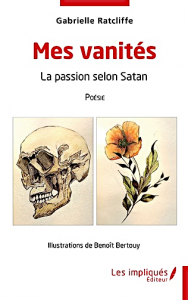 Vous trouverez dans cet ouvrage des réactions à l’intolérable, des rédemptions aimables et le récit d’angoisses et de poisse.
Vous trouverez dans cet ouvrage des réactions à l’intolérable, des rédemptions aimables et le récit d’angoisses et de poisse.
Un verre de prose légère et particulière, qui je l’espère, ne saura vous déplaire. A consommer sans modération.
Gabrielle Ratcliffe, née à Munich, manie le langage avec passion dans toute sa richesse. Aussi, les mots qu’elle dresse et adresse finissent par rendre ses écrits simples et limpides.
Elle noircit sans cesse le papier où qu’elle soit et quelle que soit son humeur. Singulière parce que plurielle !
Benoît Bertouy, dessinateur au cœur de génie, illustre avec parcimonie et rigueur, de son crayon, magique, sa prose, telles deux âmes sœurs.
MES VANITÉS
La passion selon Satan.
Poésie
Gabrielle Ratcliffe
Illustrations de Benoit Bertouy
Les Impliqués
Editions L’HARMATTAN
Date de publication: 13 décembre 2022
Langue: Français
Broché format: 13,5 x 21,5 cm
174 pages
ISBN : 978-2-38417-707-3
EAN13 : 9782384177073
Livre papier:
€ 17,5
• fleursdumal.nl magazine
More in: #Editors Choice Archiv, - Book News, - Bookstores, Archive Q-R, Archive Q-R
Marieke Lucas Rijneveld komt met een nieuwe roman.
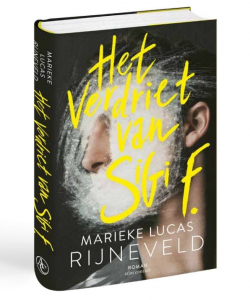
In de fictiebrochure van Atlas Contact staat een vooraankondiging van de nieuwe roman van Rijneveld.
Het verdriet van Sigi F. is de titel. Wanneer deze roman precies verschijnt is nog niet duidelijk (voorjaar, zomer, najaar?). Over de inhoud is verder ook nog niets bekend.
Marieke Lucas Rijneveld
Het verdriet van Sigi F.
Roman
• fleursdumal.nl magazine
More in: #Editors Choice Archiv, - Book Lovers, - Book News, - Bookstores, Archive Q-R, Archive Q-R, Marieke Lucas Rijneveld, Rijneveld, Marieke Lucas
Gabrielle Bates’s electric debut collection Judas Goat plumbs the depths of intimate relationships.
The book’s eponymous animal is used to lead sheep to slaughter while its own life is spared, its harrowing existence echoes through this spellbinding collection of forty poems, which wrestle with betrayal and forced obedience, violence and young womanhood, and the “forbidden felt language” of sexual and sacred love.
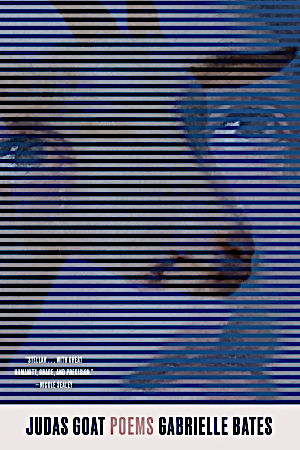
These poems conjure encounters with figures from scriptures, domesticated animals eyeing the wild, and mothering as a shapeshifting, spectral force; they question what it means to love another person and how to exorcise childhood fears. All the while, the Deep South haunts, and no matter how far away the speaker moves, the South always draws her back home.
In confession, in illumination, Bates establishes herself as an unflinching witness to the risks that desire necessitates, as Judas Goat holds readers close and whispers its unforgettable lines.
For a long time, the only part of my poems anyone praised
were the endings.
I didn’t mind.
The way I understood it, if the ending was good,
it cast goodness back over the whole.
I thought we could be saved at the last minute.
Gabrielle Bates is the author of the debut poetry collection Judas Goat (Tin House, 2023). Her work has appeared in the New Yorker, Poetry Magazine, Ploughshares, APR, Virginia Quarterly Review, New England Review, Gulf Coast, Mississippi Review, Black Warrior Review, the Best of the Net anthology, and BAX: Best American Experimental Writing, among other journals and anthologies, and her poetry comics have been featured internationally in a variety of exhibitions, festivals, and conferences. Originally from Birmingham, Alabama, she currently lives in Seattle, where she serves as the Social Media Manager of Open Books: A Poem Emporium, a contributing editor for Bull City Press, and a University of Washington teaching fellow. With Luther Hughes and Dujie Tahat, she co-hosts the podcast The Poet Salon, where poets talk over drinks.
Judas Goat: Poems
by Gabrielle Bates (Author)
January 24, 2023
Publisher: Tin House Books (January 24, 2023)
Language: English
Paperback
104 pages
ISBN-10: 1953534643
ISBN-13: 978-1953534644
$16.95
• fleursdumal.nl magazine
More in: #Editors Choice Archiv, - Book News, - Bookstores, Archive A-B, Archive A-B
Thank you for reading Fleurs du Mal - magazine for art & literature